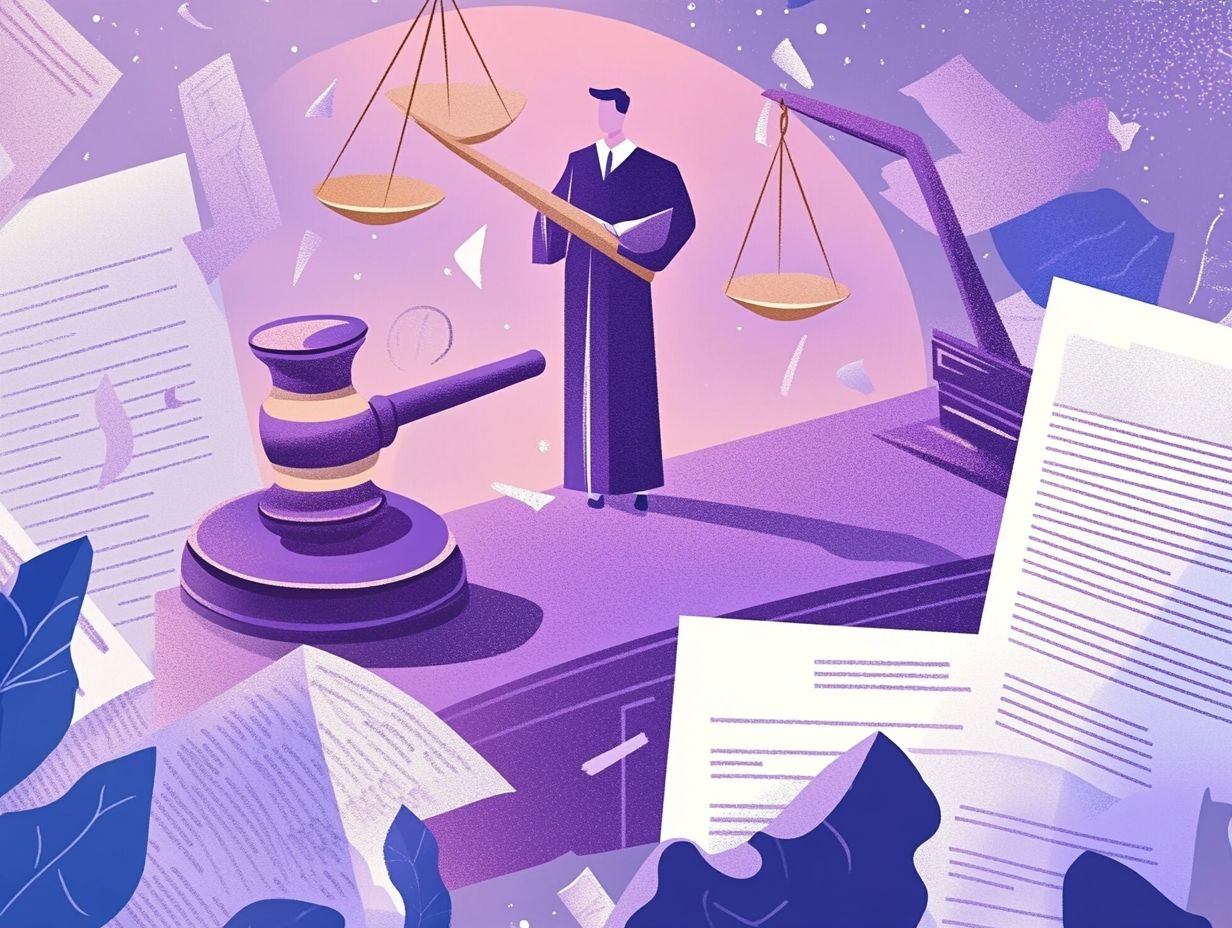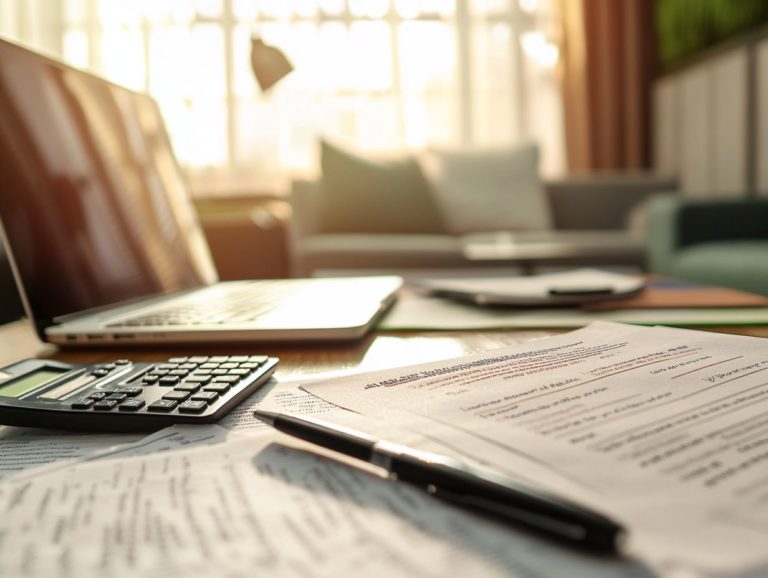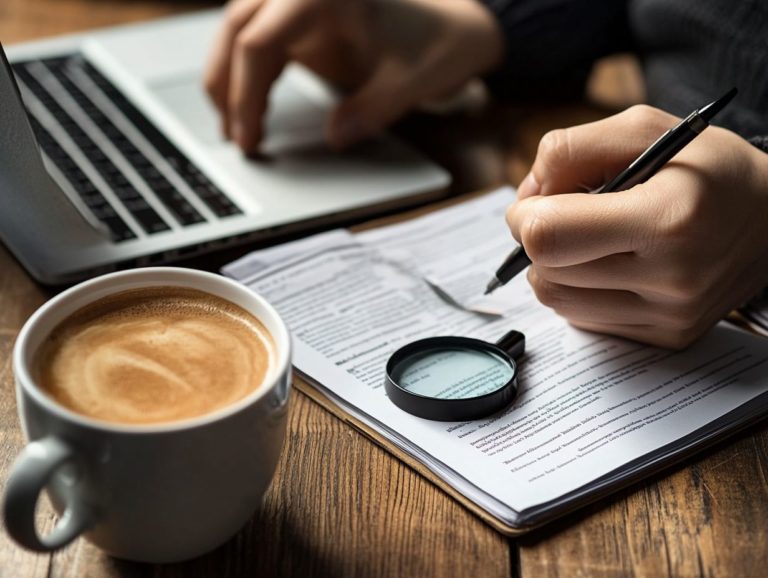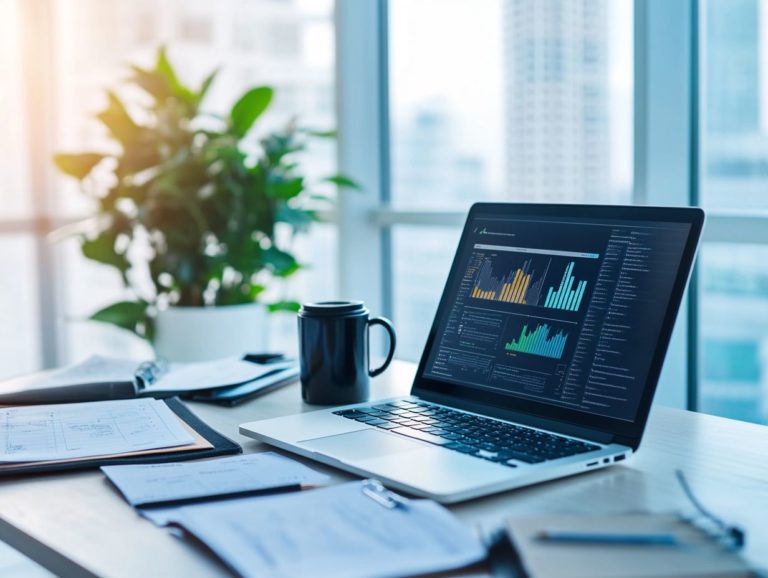What Are the Penalties for IP Infringement?
Intellectual property (IP) is a cornerstone of creativity and innovation. It protects the rights of creators and inventors like you.
The misuse or unauthorized application of these rights can yield significant repercussions.
This article explores the nuances of intellectual property infringement. You’ll learn definitions, common examples, and the various forms including copyright, trademark, and patent infringement.
Discover the legal and financial penalties that may arise, potential defenses available, and best practices to prevent violations. Understanding how to safeguard your intellectual assets will help you navigate the complexities of IP law with confidence.
Contents
- Key Takeaways:
- Understanding Intellectual Property Infringement
- Types of IP Infringement
- Penalties for IP Infringement
- Defenses Against IP Infringement Claims
- Independent Creation
- Preventing IP Infringement
- Frequently Asked Questions
- What Are the Penalties for IP Infringement?
- What are the civil penalties for IP infringement?
- What are the criminal penalties for IP infringement?
- Are there any non-monetary penalties for IP infringement?
- How can I minimize the risk of facing penalties for IP infringement?
- What should I do if I am accused of IP infringement?
Key Takeaways:
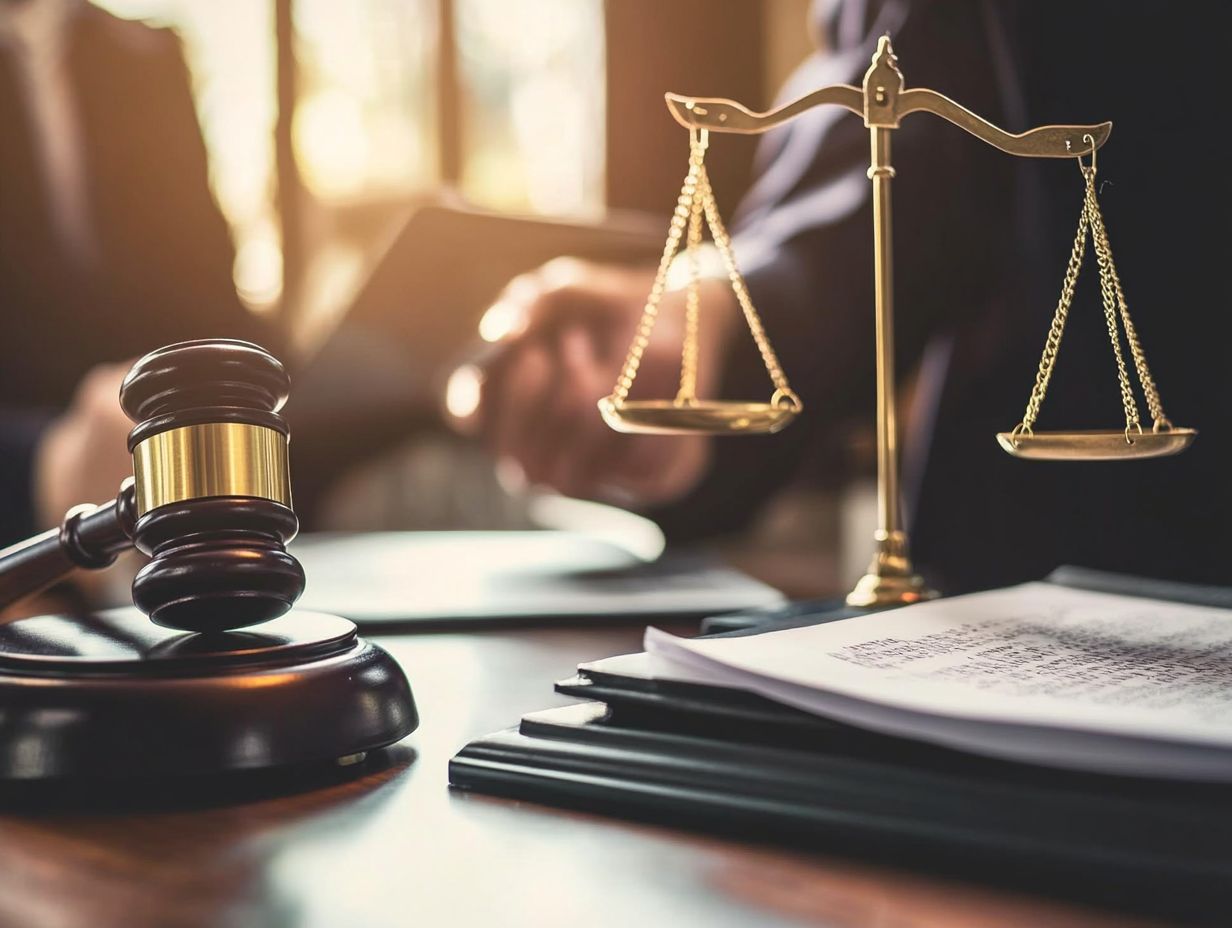
- IP infringement refers to the unauthorized use of someone else’s intellectual property, such as copyrighted works, trademarks, or patents.
- The penalties for IP infringement can include legal consequences, such as fines and injunctions, and financial consequences, like damages and lost profits.
- To defend against IP infringement claims, individuals and companies can rely on defenses such as fair use, parody, satire, and independent creation.
- Act now! Implementing best practices for protecting intellectual property is crucial to prevent infringement.
Understanding Intellectual Property Infringement
Intellectual property infringement involves a range of violations related to creative works. Copyright infringement is a significant challenge for copyright owners in the United States.
The Copyright Act, defined by Title 17 of the United States Code, safeguards the exclusive rights of creators. In today’s digital age, copyright infringement can take many forms, especially with the unauthorized use of materials online.
Unauthorized use of materials often leads to complex legal battles and hefty penalties. High-profile cases involving individuals like Kim Dotcom and corporations such as Techworld Inc. illustrate these challenges.
Types of IP Infringement
Intellectual property infringement includes several distinct categories: copyright infringement, trademark infringement, and patent infringement. Each presents its own challenges and legal consequences.
Copyright infringement occurs when protected material is used without permission. Trademark infringement involves the improper use of symbols or phrases that differentiate goods or services.
Patent infringement, on the other hand, involves unauthorized use, production, or sale of patented inventions. This requires thorough legal examination and often results in expensive litigation.
Copyright Infringement
Copyright infringement happens when you use a copyrighted work without permission from the copyright owner. This violates their exclusive rights and can manifest as unauthorized reproduction, distribution, or performance of the material.
The penalties for copyright infringement can be serious. They may include civil penalties, set fines determined by the law, and even criminal penalties in cases of willful infringement.
Understanding copyright rights is essential. Copyright owners have exclusive authority over how their works are used, which includes reproduction and adaptations. Legal frameworks like the Copyright Act protect these rights and outline the repercussions of infringement.
Set fines determined by the law can often exceed the actual damages suffered, acting as a strong deterrent against infringement. This reinforces the need for you and others to honor these exclusive rights. Failing to do so harms creators and undermines the integrity of the entire creative economy.
Take action now! Consult a legal expert or conduct an IP audit to protect your intellectual property.
Trademark Infringement
Trademark infringement means using a trademark or service mark without permission. This can confuse consumers about the source of goods or services.
As a trademark owner, you have exclusive rights to your marks. The law offers protections to safeguard your rights.
To establish trademark rights, your mark must be distinctive and used in commerce. You need to show that it is linked to specific products or services.
Litigation may be necessary to enforce these rights. You must prove that consumer confusion is likely.
The case of Ford Motor Co. v. Ford Fiat illustrates how courts evaluate factors like mark strength and evidence of consumer confusion.
The Lanham Act outlines how to address infringement. It helps you defend your trademarks and emphasizes the need for proactive trademark management.
Patent Infringement
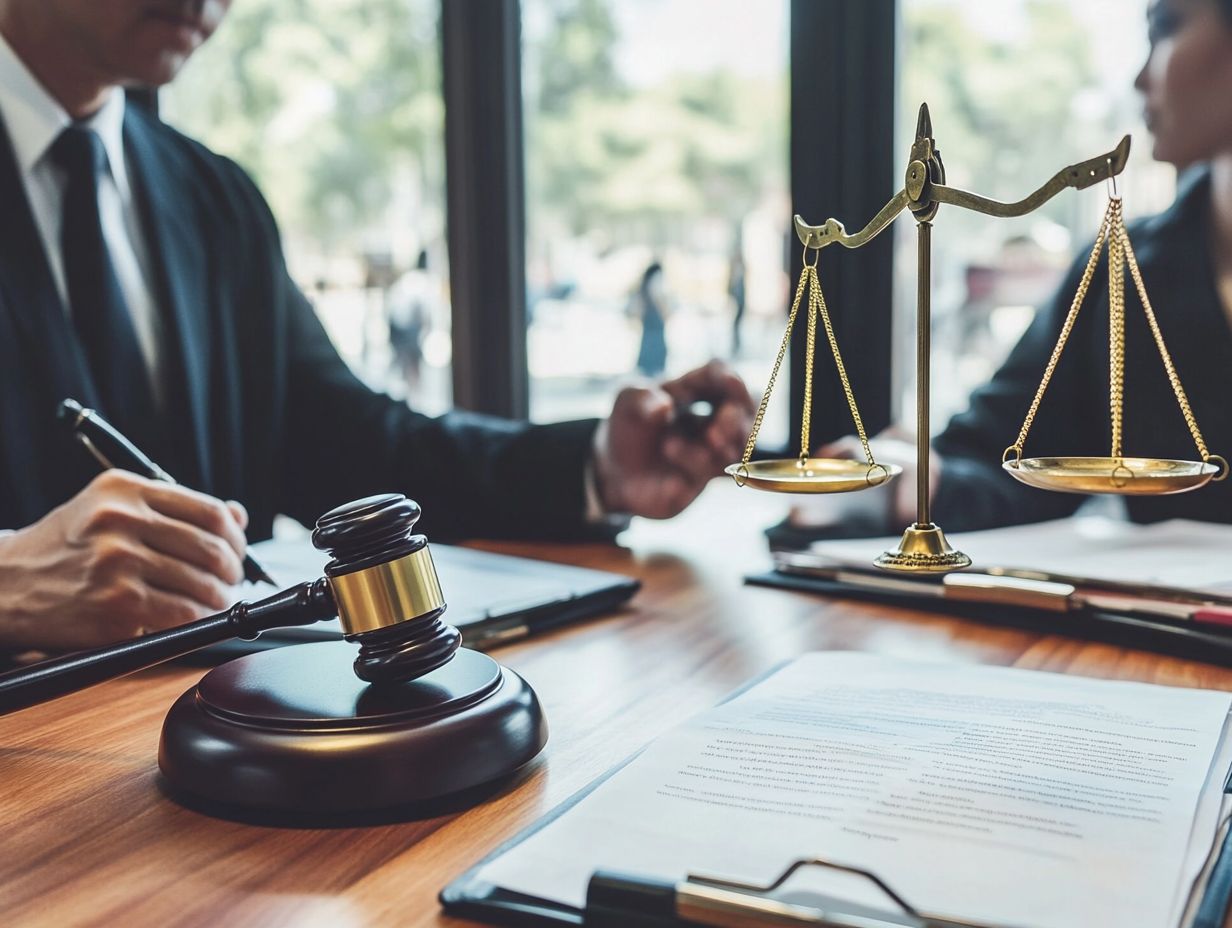
Patent infringement occurs when you use, produce, or sell a patented invention without permission. This violates the owner’s exclusive rights.
Patent owners can take legal action, which may involve civil penalties like damages and injunctions to stop further infringement.
Understanding how to acquire patents is crucial. This process usually involves a detailed examination by the United States Patent and Trademark Office (USPTO).
Once granted, a patent gives you exclusive rights for about 20 years.
If a claim arises, the litigation process can be lengthy and complex. It may require extensive discovery and expert testimony to verify the patent’s validity.
If you’re a victim of patent infringement, you can seek various damages. This could include compensatory and, in some situations, treble damages.
Penalties for IP Infringement
Penalties for IP infringement vary depending on the type and circumstances of the infringement. They can involve both civil and criminal consequences.
For copyright infringement, courts may impose statutory damages or actual damages reflecting the losses suffered by the copyright owner.
You may also face injunctions that stop further infringement and might have to pay attorneys’ fees. This can greatly increase the overall cost of infringement.
Legal Consequences
The consequences of IP infringement can be severe. They might lead to civil and criminal penalties against you.
If faced with copyright infringement claims, you could incur fines and statutory damages. In willful infringement cases, imprisonment is also possible.
The Harper & Row v. Nation Enterprises case highlighted the importance of respecting copyright. It ruled against unauthorized publication of memoir excerpts, resulting in financial consequences.
Similarly, Gordon v. Drape Creative, Inc. showed that courts can award substantial statutory damages, which can reach $30,000 per work.
In willful infringement cases, damages can increase to $150,000 per infringement. This underscores the need for strict adherence to copyright guidelines.
These precedents remind us of the importance of respecting intellectual property rights and the potential consequences of ignoring them.
Financial Consequences
The financial consequences of IP infringement can be substantial for you. Potential damages awarded to copyright owners include real losses and lost earnings directly attributable to the infringement.
Set fines defined by law can soar, particularly in cases of willful copyright infringement, leaving you liable for significant financial penalties. Understanding copyright laws is crucial to navigate this landscape effectively.
Courts evaluate these damages based on various factors, including the extent of the infringement and its impact on the copyright holder’s revenue. Take, for instance, the case of Capitol Records v. Thomas-Rasset. The court imposed substantial statutory damages to reflect the blatant disregard for copyright laws, culminating in a multi-million dollar penalty. This case shows just how serious the financial risks are!
You need to be aware of these risks before it’s too late! While actual damages reflect direct losses incurred, statutory damages can lead to much steeper penalties. This underscores the potential for severe financial repercussions should copyright laws be violated.
Defenses Against IP Infringement Claims
Defenses against IP infringement claims can often feel intricate and layered, presenting a range of legal arguments at your disposal.
One of the most frequently invoked defenses is ‘fair use,’ which permits limited use of copyrighted material without permission under specific conditions, such as for criticism or educational purposes.
Defenses like parody and satire offer legal protection for transformative works that comment on or critique the original creation.
You might also consider asserting independent creation, which claims that the alleged infringer had no access to the original work and crafted their own version independently.
Fair Use
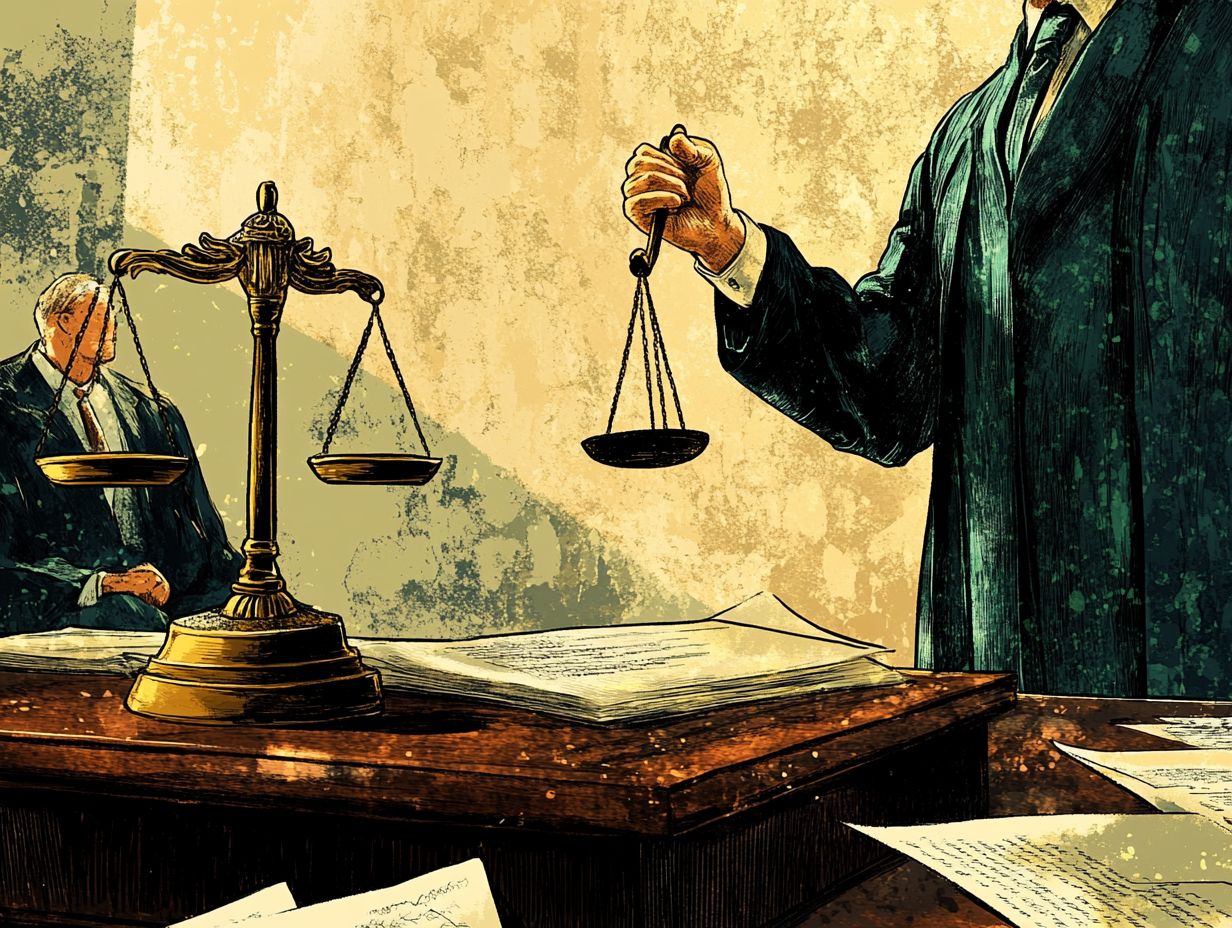
Fair use is a legal doctrine that allows you to use copyrighted material in a limited way without needing permission from the copyright owner. This is especially relevant for purposes like criticism, commentary, news reporting, teaching, or research.
To determine whether your use qualifies as fair use, you’ll need to consider specific criteria that evaluate the purpose, nature, amount, and impact on the market value (the price people would pay for the original work) of the original work. It s a nuanced defense against copyright infringement claims.
These criteria aim to strike a balance between the rights of copyright holders and the public’s right to access and benefit from creative works. For example, courts have assessed fair use in landmark cases like Campbell v. Acuff-Rose Music, Inc., where the Supreme Court concluded that a parody could qualify as fair use because it transformed the original work’s intent. In another case, Cariou v. Prince, the court ruled that Prince’s artistic reinterpretation of photographs fell under fair use.
These decisions highlight how courts consider not just the strict letter of the law but also the broader cultural and educational context, continually shaping the boundaries of fair use.
Parody and Satire
Parody and satire are recognized defenses against copyright infringement claims, empowering you as a creator to interact with copyrighted works in a way that critiques or comments on the original material.
These defenses revolve around the transformative nature of your work. Courts often evaluate if your creation adds new expression or meaning, differentiating it from the original copyrighted work.
In landmark cases like Campbell v. Acuff-Rose Music, Inc., the Supreme Court highlighted these defenses, demonstrating how a parody can offer deeper social commentary, questioning the intent behind your use of the original work.
Similarly, in The Dr. Seuss Enterprises, L.P. v. Penguin Books USA, Inc., the court upheld a satirical piece that cleverly reinterpreted a beloved children’s book, recognizing its substantial artistic value.
Courts generally apply a four-factor test under the fair use doctrine, weighing the purpose of your work, its nature, the amount used, and its potential impact on the market value. This rigorous examination serves to protect your legitimate creative expression while ensuring that the rights of original creators are respected.
Stay informed about copyright laws to protect your creativity and avoid penalties!
Independent Creation
The defense of independent creation argues that you created your work without ever having access to the original copyrighted material, effectively nullifying any accusations of copyright infringement. This defense holds particular significance in instances where similarities between works appear purely coincidental.
It s your responsibility to convincingly demonstrate that your creation emerged genuinely independent of the other. In the realm of copyright law, the independent creation defense is a vital shield against baseless infringement claims.
Take, for example, the landmark case of Scerezzo v. The New Amsterdam Theater, where the court favored the defendant, highlighting that they developed their musical composition entirely independently, without any exposure to the plaintiff’s work.
The case showed that you must prove your work did not access the original piece. Similarly, the Harper & Row v. Nation Enterprises case showcased the burden of proof resting squarely on you as the alleged infringer, requiring you to show that your work did not access the original piece.
Establishing independent creation usually involves presenting evidence such as drafts, recordings, or witnesses that can support your creative process. This way, you demonstrate the legitimate avenues available to affirm your rights while ensuring that true originality is acknowledged and protected.
Preventing IP Infringement
Protecting your work is crucial! Get proactive now to keep your rights safe. Preventing IP infringement demands a proactive approach coupled with a solid understanding of copyright, trademark, and patent laws to effectively safeguard your intellectual property.
By embracing best practices, you can shield your work from unauthorized use, thus preserving your rights and maximizing your revenue potential. This often entails clearly identifying your intellectual property, implementing robust monitoring systems, and establishing legal safeguards to thwart infringement before it even has a chance to occur.
Best Practices for Protecting Intellectual Property
To effectively protect your intellectual property, it’s essential to adhere to best practices that encompass copyright, trademark, and patent laws. This means registering your works with the U.S. Copyright Office, securing trademarks for your brand identity, and filing for patents to safeguard your inventions.
Staying informed about intellectual property rights can further prevent infringement and bolster your legal protections. As a creator or business, you should consider not only the initial registration but also the classifications that best suit your unique offerings.
For copyright, maintaining a detailed record of your work’s development including drafts and dates can be invaluable in legal disputes. In terms of trademarks, conducting a thorough search for existing marks ensures that your new brands are shielded from potential conflicts.
Understanding the different types of patents utility, design, and plant is crucial for selecting the right type of protection based on the nature of your invention. Regularly reviewing and renewing your registrations is vital as well; intellectual property rights can lapse and may require recertification to maintain their validity.
Frequently Asked Questions
What Are the Penalties for IP Infringement?
The penalties for IP infringement can vary depending on the severity of the offense and the type of intellectual property that was infringed upon. In general, the penalties include fines, damages, and potential legal action.
What are the civil penalties for IP infringement?
Civil penalties for IP infringement typically involve monetary damages, which are meant to compensate the rightful owner for any losses incurred as a result of the infringement. These damages can include lost profits, as well as any other financial harm caused by the infringement.
What are the criminal penalties for IP infringement?
In addition to civil penalties, IP infringement can also result in criminal charges. This is typically reserved for more serious cases of infringement, such as counterfeiting or piracy. Criminal penalties can include fines, imprisonment, and probation.
Are there any non-monetary penalties for IP infringement?
Yes, there are non-monetary penalties that can be imposed for IP infringement. These can include injunctions, which prohibit the infringer from continuing to use the intellectual property, as well as the destruction of any infringing materials.
How can I minimize the risk of facing penalties for IP infringement?
To minimize the risk of penalties for IP infringement, you need proper authorization to use copyrighted material or trademarks. Regularly check your use of creative works to ensure you comply with the law.
What should I do if I am accused of IP infringement?
If someone accuses you of IP infringement, seek legal help right away. An experienced lawyer can clarify the accusations and defend your rights. Take these accusations seriously and act quickly.

